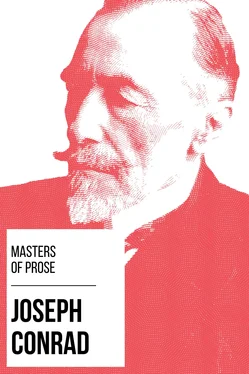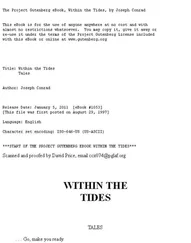He came quite close to the ship's side and raised a harassed countenance, round and flat, with that curl of black hair over the forehead and a heavy, pained glance.
“Good morning.”
“Good morning.”
He looked hard at me: I was a new face, having just replaced the chief mate he was accustomed to see; and I think that this novelty inspired him, as things generally did, with deep-seated mistrust.
“Didn't expect you till this evening,” he remarked, suspiciously.
I didn't know why he should have been aggrieved, but he seemed to be. I took pains to explain to him that, having picked up the beacon at the mouth of the river just before dark and the tide serving, Captain C—— was enabled to cross the bar and there was nothing to prevent him going up the river at night.
“Captain C—— knows this river like his own pocket,” I concluded, discursively, trying to get on terms.
“Better,” said Almayer.
Leaning over the rail of the bridge, I looked at Almayer, who looked down at the wharf in aggrieved thought. He shuffled his feet a little; he wore straw slippers with thick soles. The morning fog had thickened considerably. Everything round us dripped—the derricks, the rails, every single rope in the ship—as if a fit of crying had come upon the universe.
Almayer again raised his head and, in the accents of a man accustomed to the buffets of evil fortune, asked, hardly audibly:
“I suppose you haven't got such a thing as a pony on board?”
I told him, almost in a whisper, for he attuned my communications to his minor key, that we had such a thing as a pony, and I hinted, as gently as I could, that he was confoundedly in the way, too. I was very anxious to have him landed before I began to handle the cargo. Almayer remained looking up at me for a long while, with incredulous and melancholy eyes, as though it were not a safe thing to believe in my statement. This pathetic mistrust in the favourable issue of any sort of affair touched me deeply, and I added:
“He doesn't seem a bit the worse for the passage. He's a nice pony, too.”
Almayer was not to be cheered up; for all answer he cleared his throat and looked down again at his feet. I tried to close with him on another tack.
“By Jove!” I said. “Aren't you afraid of catching pneumonia or bronchitis or some thing, walking about in a singlet in such a wet fog?”
He was not to be propitiated by a show of interest in his health.
His answer was a sinister “No fear,” as much as to say that even that way of escape from inclement fortune was closed to him.
“I just came down . . .” he mumbled after a while.
“Well, then, now you're here I will land that pony for you at once, and you can lead him home. I really don't want him on deck. He's in the way.”
Almayer seemed doubtful. I insisted:
“Why, I will just swing him out and land him on the wharf right in front of you. I'd much rather do it before the hatches are off. The little devil may jump down the hold or do some other deadly thing.”
“There's a halter?” postulated Almayer.
“Yes, of course there's a halter.” And without waiting any more I leaned over the bridge rail.
“Serang, land Tuan Almayer's pony.”
The cook hastened to shut the door of the galley, and a moment later a great scuffle began on deck. The pony kicked with extreme energy, the kalashes skipped out of the way, the serang issued many orders in a cracked voice. Suddenly the pony leaped upon the fore-hatch. His little hoofs thundered tremendously; he plunged and reared. He had tossed his mane and his forelock into a state of amazing wildness, he dilated his nostrils, bits of foam flecked his broad little chest, his eyes blazed. He was something under eleven hands; he was fierce, terrible, angry, warlike; he said ha! ha! distinctly; he raged and thumped—and sixteen able-bodied kalashes stood round him like disconcerted nurses round a spoiled and passionate child. He whisked his tail incessantly; he arched his pretty neck; he was perfectly delightful; he was charmingly naughty. There was not an atom of vice in that performance; no savage baring of teeth and laying back of ears. On the contrary, he pricked them forward in a comically aggressive manner. He was totally unmoral and lovable; I would have liked to give him bread, sugar, carrots. But life is a stern thing and the sense of duty the only safe guide. So I steeled my heart, and from my elevated position on the bridge I ordered the men to fling themselves upon him in a body.
The elderly serang, emitting a strange, inarticulate cry, gave the example. He was an excellent petty officer—very competent, indeed, and a moderate opium-smoker. The rest of them in one great rush smothered that pony. They hung on to his ears, to his mane, to his tail; they lay in piles across his back, seventeen in all. The carpenter, seizing the hook of the cargo-chain, flung himself on the top of them. A very satisfactory petty officer, too, but he stuttered. Have you ever heard a light-yellow, lean, sad, earnest Chinaman stutter in Pidgin-English? It's very weird, indeed. He made the eighteenth. I could not see the pony at all; but from the swaying and heaving of that heap of men I knew that there was something alive inside.
From the wharf Almayer hailed, in quavering tones:
“Oh, I say!”
Where he stood he could not see what was going on on deck, unless, perhaps, the tops of the men's heads; he could only hear the scuffle, the mighty thuds, as if the ship were being knocked to pieces. I looked over: “What is it?”
“Don't let them break his legs,” he entreated me, plaintively.
“Oh, nonsense! He's all right now. He can't move.”
By that time the cargo-chain had been hooked to the broad canvas belt round the pony's body; the kalashes sprang off simultaneously in all directions, rolling over each other; and the worthy serang, making a dash behind the winch, turned the steam on.
“Steady!” I yelled, in great apprehension of seeing the animal snatched up to the very head of the derrick.
On the wharf Almayer shuffled his straw slippers uneasily. The rattle of the winch stopped, and in a tense, impressive silence that pony began to swing across the deck.
How limp he was! Directly he felt himself in the air he relaxed every muscle in a most wonderful manner. His four hoofs knocked together in a bunch, his head hung down, and his tail remained pendent in a nerveless and absolute immobility. He reminded me vividly of the pathetic little sheep which hangs on the collar of the Order of the Golden Fleece. I had no idea that anything in the shape of a horse could be so limp as that, either living or dead. His wild mane hung down lumpily, a mere mass of inanimate horsehair; his aggressive ears had collapsed, but as he went swaying slowly across the front of the bridge I noticed an astute gleam in his dreamy, half-closed eye. A trustworthy quartermaster, his glance anxious and his mouth on the broad grin, was easing over the derrick watchfully. I superintended, greatly interested.
“So! That will do.”
The derrick-head stopped. The kalashes lined the rail. The rope of the halter hung perpendicular and motionless like a bell-pull in front of Almayer. Everything was very still. I suggested amicably that he should catch hold of the rope and mind what he was about. He extended a provokingly casual and superior hand.
“Look out, then! Lower away!”
Almayer gathered in the rope intelligently enough, but when the pony's hoofs touched the wharf he gave way all at once to a most foolish optimism. Without pausing, without thinking, almost without looking, he disengaged the hook suddenly from the sling, and the cargo-chain, after hitting the pony's quarters, swung back against the ship's side with a noisy, rattling slap. I suppose I must have blinked. I know I missed something, because the next thing I saw was Almayer lying flat on his back on the jetty. He was alone.
Читать дальше












